Burning issues
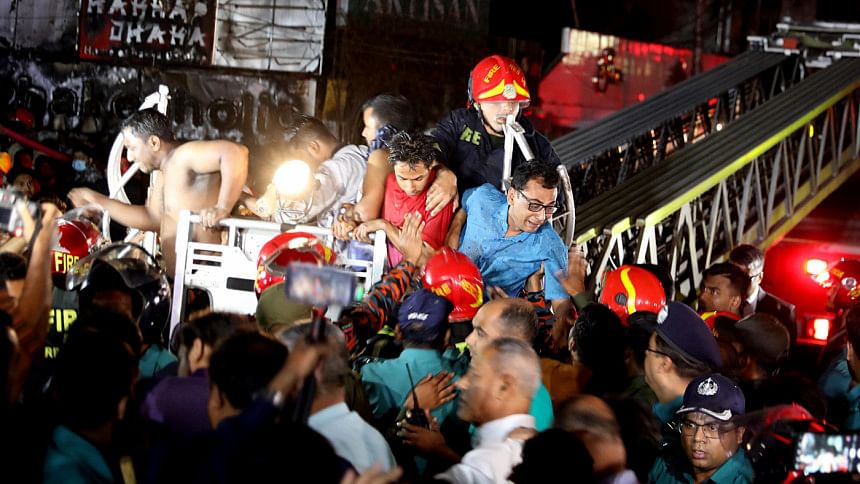
There is no shortage of live footage of the fire that engulfed a Bailey Road building which housed a number of popular eateries. Too many onlookers with mobile phones became citizen journalists. Now that the firefighters have defused the flames, the extent of the damage in terms of lives and property has become painfully clear. As of writing this piece, 46 people have reportedly died, and tens of others are critically injured.
Thursday night, which ushers in the weekend, is always a popular time for social outings. The extra day of February on a leap year adds to a calendrical curiosity that had probably prompted many others to make the evening memorable. But the leap day became unforgettable for all the wrong reasons. A fire that started on the ground floor did not wait long to spread up the seven-storey shopping outlet, ironically named the Green Cozy Cottage Shopping Mall. There was no way for those stranded on the top floors to come down or break through the sealed glasses, as is customary in air-conditioned construction.
Authorities have issued their wise-after-the-fact observations regarding the building—that it was not following the safety code, and that it had just one staircase which, too, was tucked in among a series of gas cylinders that stood like silent sentinels of peril. Imagine a city road decorated with commercial and residential high-rise buildings, all decked with gas cylinders, with the potential of becoming unwitting accomplices in catastrophic disasters. The city's uncontrolled expansion has transformed it into a ticking bomb, just one trigger away from erupting.
The unsuspecting customers gathered, hoping for a good time. Any of us could have been there at the wrong time and in the wrong place, to be featured on the list of victims. Quite often, we revisit such accidents to identify the negligence that reduces our homes to ashes, snuffs out life in an instant, tears apart families, and puts us at the mercy of fiery fury. But there seem to be no lessons that we can learn from past tragedies, as we helplessly resign to the inevitability of disasters.
In a country that is smart enough to widen its surveillance net to detect any unholy expression, how do we justify the violation of safety protocols in a public place? As common sense demands, one cannot block the lone staircase of a commercial building, that too with gas cylinders. But apparently, nobody saw this as a problem. Even if someone did, they were probably silenced, ignored, or managed. Violation of rules gives those in power the ability to demonstrate their "might" in public. They are not shy about showing off their prowess with hooters, flag stands, firearms, sidekicks, lackeys, and fancy smartphones. Accidents expose the absurdity of our haughtiness and the fallacy of our existence.
Prior to the fire, an undated Google Maps image of the ill-fated shopping mall's facade showed the lined-up cylinders visible even from the main road. Yet, nobody sensed any danger. In the days to come, the audacity to publicly denounce safety protocol will surely haunt the owners. It will also haunt the naive people who prioritised personal convenience over public safety. They will recognise the fact that this accident could have been easily prevented, and scores of lives could have been saved.
These days, in most cases, the usual culprits are unsafe gas cylinders and faulty electrical appliances. The government's late realisation of the need to protect our natural gas reserves has given rise to pressurised gas containers for both household and commercial usage. Only a handful of manufacturers control the market. A notorious group fixes the price of these bottles, charging way above the approved rate. This has tempted businesses to cut corners to increase their profit margin. Then there are the handling and transportation fees. But even that isn't the end. There is also a growing tendency to tamper with gas cylinders. Authorities have found suppliers or their middlemen guilty of employing dangerous tactics such as adding sand, water, or other substances to cylinders in order to increase their weight and thus the profit margin. The greed of suppliers turns these gas cylinders into inflatable devices. Then, there are the issues of lack of storage space and a dearth of knowledge about the proper handling of gas cylinders. The Bailey Road building likely erupted in flames on Thursday due to a combination of all these factors.
But it is not enough to point out the obvious. The public is tired of the recurrence of avoidable accidents. The enforcement of public safety protocols is a need of the hour. Businesses must comply with the operational code of conduct without any compromises. But on a civic level, we too must do our share. We need to warn the authorities whenever there is an anomaly. We need to educate ourselves with the knowledge and tools to protect our communities.
For instance, often, firefighters cannot carry out their duties because of the presence of too many curious onlookers. Emergency vehicles cannot access the accident site because most of us on the road are not willing to sacrifice our comfort for the sake of a fire truck flashing red lights. We convince ourselves that all flashing lights signal fake hooters, devoid of reason and rationality. This mindset must be changed. There is also no harm in improving our safety gear and measures. Each kitchen should be protected with sprinklers, fire blankets, and protective doors to save time in case of emergencies. These technologies are now easily available. Government subsidies can make them affordable, too. We need sincerity and integrity to implement the basic safety rules.
We can collectively sigh and moan about the ticking bomb that the city has become. But we must realise that the power to defuse such threats lies in our collective hands. We must heed the warning signs and take action before tragedy strikes once more. Together, perhaps we can prevent the next spark from igniting an all-consuming conflagration.
Dr Shamsad Mortuza is professor of English at Dhaka University.
Views expressed in this article are the author's own.
Follow The Daily Star Opinion on Facebook for the latest opinions, commentaries and analyses by experts and professionals. To contribute your article or letter to The Daily Star Opinion, see our guidelines for submission.


 For all latest news, follow The Daily Star's Google News channel.
For all latest news, follow The Daily Star's Google News channel. 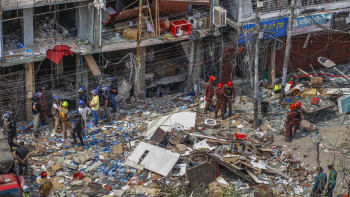

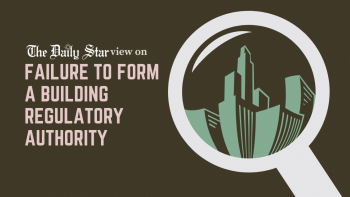
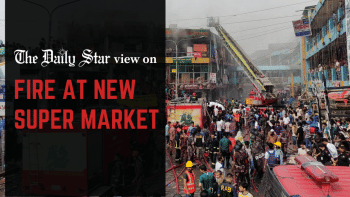



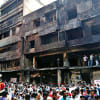




Comments